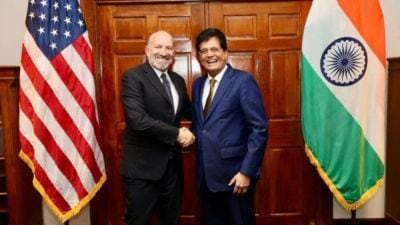He rushes in where SC didn’t tread
No mention of OBCs in Constitutional amendment; former CJI Khare says, “Never was there any mention of OBC in SC ruling”

HRD Minister Arjun Singh justifies his announcement of 27% OBC quota in Central educational institutions by citing the Constitutional amendment passed this January. This is clearly his own political twist to pre-empt any debate. For, the amendment makes no mention of OBCs.
Not only that. Former Chief Justice of India Justice V N Khare has told The Indian Express that nowhere does the OBC category figure in any of the key cases on reservation in educational institutions.
The amendment gives the State the power to make “any special provision, by law, for the advancement of any socially and educationally backward classes of citizens or for SC/STs” in admissions to educational institutions, “including private educational institutions, whether aided or unaided.” Minority educational institutions are exempt.
The phrase, “socially and educationally backward classes,” has been twisted by Arjun Singh to mean OBCs. This is significant given that, as Justice Khare says, not one of the three key Supreme Court rulings on the subject, Pai, Islamic Academy and Inamdar, mentioned OBCs as a target group for reservations in educational institutions.
Justice Khare, who presided over the bench in both Pai and Islamic Academy case, made it clear: “The interpretation of Pai judgment means there can be reservation fixed for the weaker sections but never was there any mention of OBC. The Constitution doesn’t define or recognise OBC, it’s a government interpretation.” Consider the key SC rulings on the subject:
• T M A Pai Foundation case (Oct 31, 2002): The main question was whether quotas could be fixed in government-aided and unaided minority institutions. The majority judgment of the 11-judge bench was that there could be reservation for “weaker sections” of society but there was no reference to OBCs.
• Islamic Academy case (Aug 14, 2003 ): To dispel “confusion” over the Pai ruling, a five-judge bench was set up for an “explanation.” This bench said that as per Pai, criteria could be fixed for reservations in unaided and aided minority institutions. Once again, no reference to OBCs.
• Inamdar (Aug 12, 2005 ): A seven-judge bench was formed to explain the earlier two rulings. It ruled that “neither the policy of reservation can be enforced by the State nor any quota or percentage of admissions can be carved out to be appropriated by the State in a minority or non-minority unaided educational institution”. It also made it clear that the state “cannot insist on private educational institutions which receive no aid from the State to implement State’s policy on reservation for granting admission on lesser percentage of marks, i.e. on any criterion except merit.”
It was to rollback this ruling that the amendment was made in January, the amendment which Arjun Singh is now using. Asked what would happen if this amendment is challenged, Justice Khare said: “Another 11-judge bench has to hear the challenge and will decide the validity of this amended provision.”





- 01
- 02
- 03
- 04
- 05


























